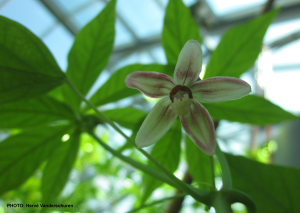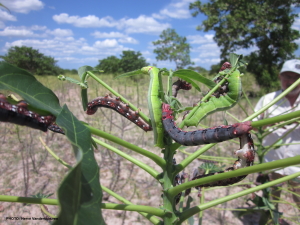 Virus resistance
Virus resistance
Cassava production is constrained by viral diseases, especially in Africa and in the Indian sub-Continent. Cassava mosaic disease (CMD) is the important disease threatening cassava production in Africa. CMD is caused by a group of whitefly-transmitted cassava geminiviruses (DNA viruses). The Plant Genetics Lab uses Next Generation Sequencing to investigate the genetic basis for tolerance to CMD infection in cassava.
In the last decade, cassava brown streak disease (CBSD) has emerged as a devastating disease causing important losses in East Africa. Even though it was first identified in 1930’s, molecular diversity and dissemination dynamics remain poorly studied. CBSD is caused by cassava brown streak viruses (CBSVs), RNA viruses belonging to the Potyviridae family.
The Plant Genetics Lab develops infectious clones for CBSV inoculation on cassava and investigates molecular determinants of natural resistance against CBSVs as well as implements genome editing technologies to confer resistance to CBSD.
 Plant Development
Plant Development
A relatively wide diversity exists in time required for flowering as well as storage root initiation in root crops. Using next generation sequencing (NGS) approaches combined with mutagenesis of candidate genes, the Plant Genetics Laboratory identifies genes involved in life cycle of root crops (i.e. cassava and chicory). A better understanding of the molecular determinants of plant development is also instrumental to facilitate breeding of root-associated traits.
Post-Harvest
Shortly after harvest, cassava storage roots initiate the so-called post-harvest physiological deterioration (PPD). PPD is a major problem in cassava value chain as the quality of the roots is reduced by the physiological deterioration. Despite the importance of PPD in the world, limited fundamental research has been performed to understand the molecular events responsible for the initiation and development of PPD symptoms. The Plant Genetics Lab investigates the cellular and molecular events occurring at the cassava root damage sites. In parallel, alternative methods to delay the onset of PPD are being developed in collaboration with research teams in Asia and Africa.
Cold induced sweetening (CIS) occurs in potato during prolonged storage of tubers at cold temperature. This phenomenon is a major constraint for the potato value chain as anti-sprouting agents need to be used for long-term storage at higher temperature. The Plant Genetics Lab investigates new genetics approaches as well as new treatments in order to develop new methods for long-term storage of potato.
 Pest resistance
Pest resistance
Several pests interfere with cassava crop cycle and reduce crop yield. The Plant Genetics Lab investigates the cassava germplasm collection to identify cassava accessions with enhanced tolerance against selected pests and uses OMICS approaches to decipher the molecular determinants of resistance. Novel approaches to confer resistance to whitefly, an important vector of viral diseases in cassava, are also being implemented.
